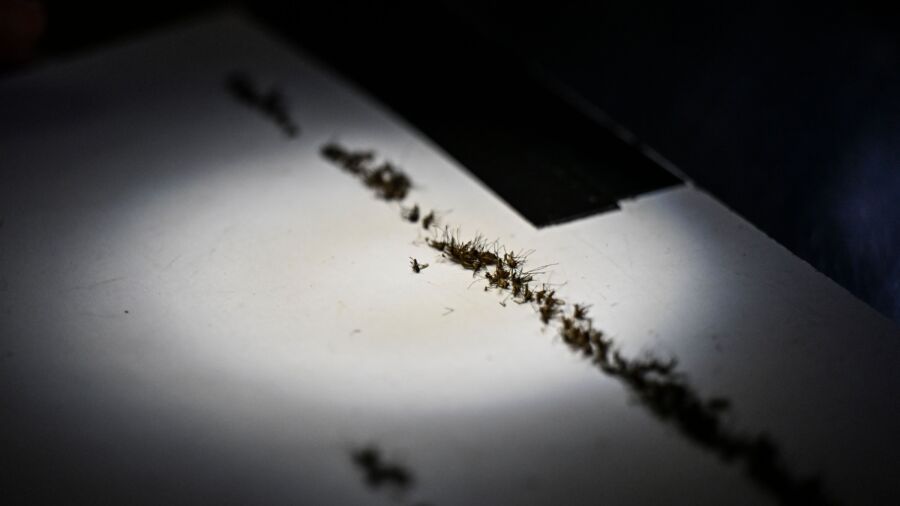The most recent locally acquired malaria case is different from the others that have popped up in the United States this year, according to the U.S. Centers for Disease Control and Prevention (CDC).
The species of malaria detected in a Maryland resident this month following local transmission was plasmodium falciparum, the CDC, which has been assisting Maryland officials in an investigation of the case, said on Aug. 28.
That means the case is not related to previously recorded cases involving local transmission in Texas and Florida.
Those cases tested for plasmodium vivax, a different species.
The new cases across the three states are the first locally transmitted cases in the United States since 2003, when an outbreak occurred in Palm Beach County, Florida.
CDC is working with health officials in all three states to investigate and monitor the cases.
The Maryland Department of Health announced the state’s case on Aug. 18.
Officials said then that the person lives in Maryland, was hospitalized, and is now recovering. The person did not travel recently to another country, Florida, or Texas.
“Malaria was once common in the United States, including in Maryland, but we have not seen a case in Maryland that was not related to travel in over 40 years,” Maryland Department of Health Secretary Laura Herrera Scott said at the time. “We are taking this very seriously and will work with local and federal health officials to investigate this case.”
“Malaria can be very dangerous and even fatal if it is not treated, but early treatment reduces the chances of complications,” added Deputy Secretary for Public Health Services Dr. Nilesh Kalyanaraman. “We urge the public to take precautions against mosquito bites, and if you develop symptoms after traveling abroad, seek urgent medical care.”
The agency didn’t disclose the age or sex of the person, more specific information about where he or she lives, the date the person became infected, or when the person was diagnosed.
“To protect patient confidentiality, we are not sharing any further patient information,” a Maryland Department of Health spokesperson told The Epoch Times via email.
The spokesperson said on Aug. 29 that there have been no updates outside new information on the species.
The CDC said that surveillance for additional cases of malaria, as well as surveillance and control of mosquitoes with malaria, will continue in Maryland, Florida, and Texas for eight weeks following the most recent case in each state.
Earlier Cases
Texas authorities detected a case in June in Cameron County. The person had spent time working outdoors, officials said. No other cases have been detected in the state.
Florida officials also started reporting cases in June, in Sarasota County. The number of cases later climbed to seven.
Malaria is usually caused when people are bitten by mosquitoes that have been infected by certain kinds of parasites.
More than 2,000 cases of malaria are reported in the United States each year, according to the CDC. But the cases are typically contracted in another country, with the person returning or traveling to the United States after becoming infected.
Symptoms include fever, sweating, and chills. Severe symptoms include kidney failure, seizures, and mental confusion.
People are advised to see their health care provider if they are experiencing malaria symptoms and have traveled in the last year to a place where malaria occurs.
A small number of patients die, but most recover with treatment.
Treatments include chloroquine, Qualaquin, and Malarone.
In addition to avoiding areas with lots of mosquitos, officials recommend wearing bug spray; donning loose-fitting, long-sleeved clothing; keeping doors and windows closed or covered with screens; repairing broken windows, doors, and screens; and removing any standing water from their properties.
Patients Speak Out
Hannah Heath, 39, was one of the people who contracted malaria locally.
Ms. Heath told WUSF Public Media that she was in the hospital for five days. She felt miserable at first, experiencing dehydration and largely remaining bed-bound.
“I couldn’t get out of bed without somebody there to make sure I didn’t fall, and they wrapped padding around the edges of the bed, the side rails, because I could have hurt myself if I would have hit my arm, there could have been internal bleeding,” Ms. Heath said.
Treatments eventually worked and Ms. Heath recovered.
All the patients received treatment and “are improving clinically,” according to the CDC.
Christopher Shingler, 21, is the person who was in Texas that tested positive.
Mr. Shingler was near the U.S.–Mexico border as part of the National Guard when he became sick.
“I would wake up really early in the morning, and I would start shaking,” Mr. Shingler told NBC. “It was a lot of just trying my best to make myself eat something, as small as I could, which usually I was unsuccessful, or trying to drink water, which, again, I was unsuccessful.”
Mr. Shingler was also treated and has since recovered.
From The Epoch Times

